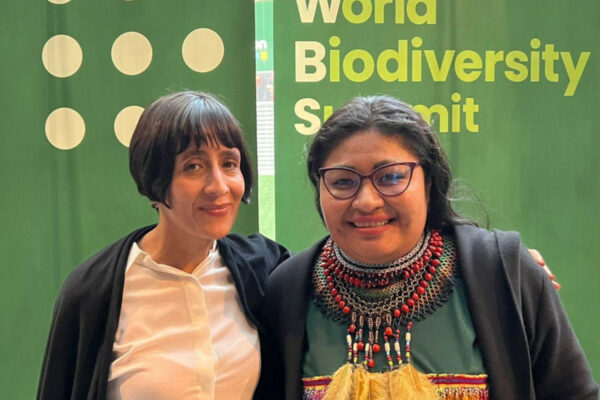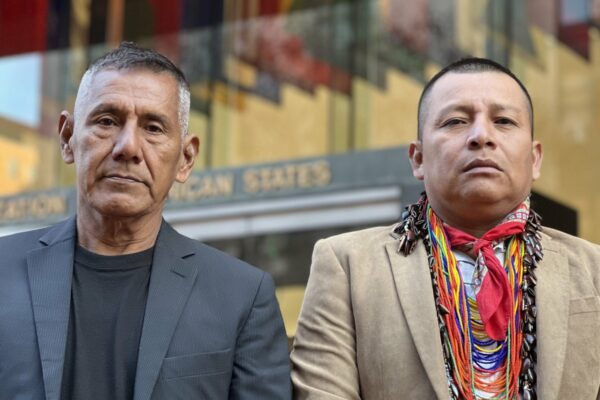DATELINE: Santa Cruz, Bolivia
BODY:
Santa Cruz, Bolivia – Environmentalists say U.S. government financing is
being misused to
finance a gas pipeline through a rare forest ecosystem in violation of the
Clinton administration’s own
policies.
American energy giants Enron and Shell, along with the Bolivian consortium
Transredes, are hurrying
to complete the 243-mile pipeline, which will extend from an existing gas
pipeline near the city of
Santa Cruz in eastern Bolivia to Cuiaba, Brazil.
In order to lay the buried pipeline, the companies have cut a 90-foot-wide
pathway through the
Chiquitano dry forest, listed among the Earth’s 200 most sensitive
ecoregions, and are digging
through the Pantanal wetlands, one of the world’s richest habitats for
wildlife.
The $570 million Cuiaba Integrated Energy Project is set to be completed by
March, financed in
part with a $200 million loan delivered to the companies on June 15 from the
Overseas Private
Investment Corp. OPIC is a U.S. government agency that helps American
companies with business
projects in less developed countries.
Many environmental groups are complaining that approval of the loan violated
OPIC’s own
regulations, which were amended by the Clinton administration in 1997 to bar
the agency from
financing “infrastructure projects in primary tropical forests.”
“OPIC is doing just what the U.S. government pledged it would no longer do,”
said Jon Sohn, an
international policy analyst at the Washington-based Friends of the Earth.
The World Wildlife Fund (WWF) called in an Oct. 1 letter to Vice President
Al Gore for the U.S.
government to withdraw OPIC financing of the project, urging that he “work
to ensure that taxpayers
dollars are not used to support this project.”
Friends of the Earth, Amazon Watch, and other U.S. environmental groups are
also seeking a
congressional investigation into OPIC’s handling of the Cuiaba pipeline
project.
An “independent environmental assessment” of the project carried out in May
by the WWF, the
Missouri Botanical Garden, Wildlife Conservation Society, Noel Kempff Museum
and Bolivian
environmental group Friends of Nature, found that the Chiquitano forest is a
primary tropical forest
of global importance.
Scientists say the 15-million-acre forest in eastern Bolivia is the last
large intact tropical dry forest in
the world. The WWF calls it “one of the richest, rarest and most
biologically outstanding habitats on
Earth.”
The independent assessment also said the pipeline will be tantamount to a
highway – providing
access to the forest for loggers, hunters, colonizers, farmers and cattle
ranchers as well as increasing
prospects for forest fires.
Enron, Shell, Transredes and OPIC rejected a recommendation from the
environmental groups that
they reroute the pipeline around the forest. They argue that the area
crossed by the pipeline is not a
primary forest and that the pipeline route will not have a negative effect.
“This route is very good and has the least impact on the Chiquitano and the
Pantanal. This is the most
feasible route,” said Eduardo Jose Cordi, director of operations for Gas
Oriente Boliviano, the
company set up to manage the Cuiaba pipeline in Bolivia.
Larry Spinelli, communications director of OPIC, said the pipeline runs
through an area that is
different from the rest of the forest because it has already been disrupted
by human intervention.
But according to Mr. Sohn of Friends of the Earth: “Saying the Chiquitano
dry forest isn’t a tropical
primary forest is like saying the Earth is flat.”
Patricia Caffrey, director of WWF-Bolivia, argued that the companies “did
not take into account
environmental or social criteria. They took the cheapest route – a straight
line.”
In a controversial move that has sharply divided environmentalists in
Bolivia and abroad, the five
organizations that produced the independent assessment have signed a letter
in which they withdrew
opposition to the pipeline route – and to OPIC financing – in exchange for
$20 million for
conservation projects in the forest.
A new organization, the Chiquitano Forest Conservation Program, has been set
up to spend the
money. The group’s board of directors is made up of representatives of the
participating energy
companies and the environmental groups who produced the report.
The agreement has only fueled opposition to the pipeline, though. WWF has
since withdrawn from
the agreement, citing concerns over conflict of interest and a lack of local
control in the
forest-conservation program.
Bolivian environmental and indigenous groups not party to the settlement
remain opposed to the
pipeline route.
GRAPHIC: Photo, Construction of access roads to a planned pipeline in both
Bolivia and Brazil by
U.S. energy firms along with Latin American partners anger environmental
groups, who see the
project destroying rare flora and fauna., By Derrick Hindery/AmazonWatch ;
Map, PIPELINE
DISPUTE, By The Washington Times













